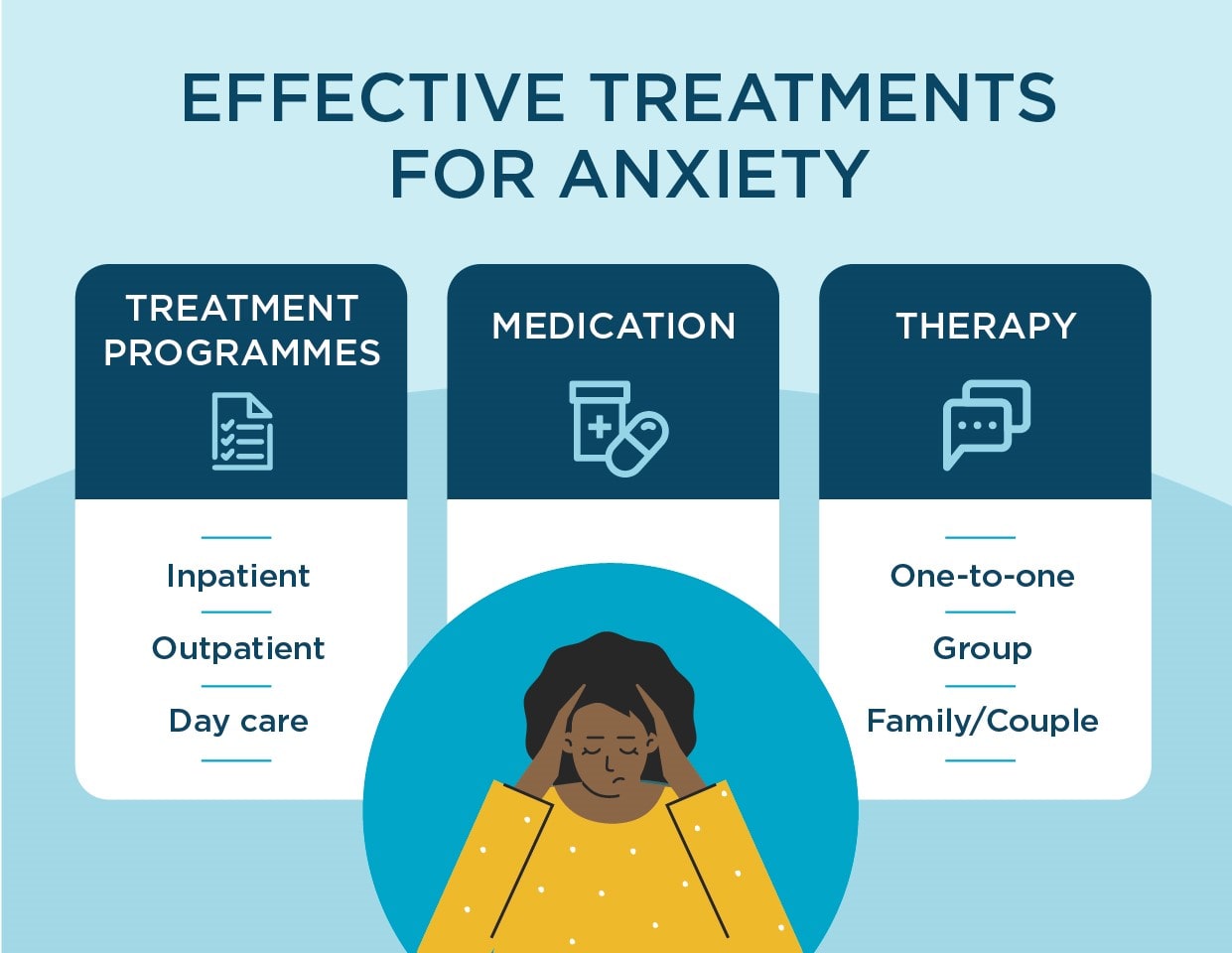Online support accessible today with a licensed therapist for anxiety
Online support accessible today with a licensed therapist for anxiety
Blog Article
Discovering Different Strategies in Counselling for Anxiousness Condition for Long Lasting Adjustment
When taking on anxiousness conditions, it's important to discover a range of counseling approaches. Each approach provides unique insights and tools to help you handle your signs effectively. You may discover that incorporating strategies can produce the most effective outcomes. Nonetheless, comprehending the subtleties of these strategies is essential to fostering lasting change. What happens if the best mix could release a new degree of psychological wellness for you?
Recognizing Anxiety Conditions: A Short Introduction
Stress and anxiety disorders, which influence millions of individuals worldwide, can significantly influence every day life. You could experience overwhelming feelings of concern or worry that seem unmanageable. These feelings can result in physical signs like a racing heart, sweating, and even wooziness. Usual types of anxiety conditions include generalized anxiousness problem, panic problem, and social anxiety problem. Each has unique indicators, however they all share a propensity to disrupt your routine and relationships.Understanding the origin causes of your anxiety is essential. It might come from genes, brain chemistry, or life experiences. Acknowledging your triggers can help you handle your actions much better. It is essential to bear in mind that you're not the only one in this struggle. Many individuals face comparable obstacles, and looking for help is a strong step towards sensation better. By discovering stress and anxiety disorders, you're currently on the course to understanding and managing your problem a lot more effectively.
Cognitive-Behavioral Therapy: Challenging Negative Thought Patterns

Determining Adverse Idea Triggers
Recognizing the specific triggers behind your negative thoughts can be necessary in taking care of anxiousness when you experience minutes of distress. Start by taking notice of situations that prompt feelings of concern or worry. Is it a crowded space, a forthcoming target date, or a discussion with particular people? Take down these circumstances in a journal. This will certainly assist you identify patterns in your thinking. Additionally, notification physical sensations that accompany your unfavorable thoughts, like an auto racing heart or tightness in your chest. By determining these triggers, you gain understanding into what's sustaining your stress and anxiety. Understanding these connections is the very first step in testing those ideas and eventually restoring control over your emotional actions.

Changing Thoughts With Positives
Testing unfavorable thought patterns is a crucial action in changing your frame of mind and reducing anxiety. You might usually locate yourself entraped in cycles of self-doubt or disastrous thinking. As opposed to letting these ideas dictate your feelings, practice replacing them with favorable affirmations or sensible options. When you assume, "I can not manage this," change it to, "I can manage obstacles one step at a time." This basic change can significantly influence your emotion. On a regular basis determining and countering these adverse thoughts aids produce a healthier inner dialogue. Keep in mind, it takes time and initiative, however consistently practicing this method can cause long lasting adjustment, encouraging you to encounter stress and anxiety with renewed confidence and strength
Structure Coping Methods With Each Other
Changing adverse thoughts is just the beginning of handling anxiety properly. To develop enduring modification, you require to develop coping methods that encourage you. Cognitive-Behavioral Therapy (CBT) helps you recognize and challenge those unhelpful idea patterns. Together, you and your therapist can discover just how these ideas impact your feelings and behaviors.Start by establishing practical strategies, like journaling or mindfulness exercises, that enable you to challenge stress and anxiety head-on. When you face your concerns progressively, you'll discover to react differently.

Mindfulness and Acceptance-Based Approaches: Growing Present-Moment Awareness
As you navigate the complexities of anxiousness, incorporating mindfulness and acceptance-based strategies can significantly boost your capability to cultivate present-moment understanding. By focusing on the here and currently, you'll discover that you can observe your thoughts and feelings without judgment. This method aids you recognize your anxiousness without really feeling bewildered by it.Engaging in mindfulness workouts, such as deep breathing, body scans, or assisted reflections, allows you to ground yourself in your existing experience. Acceptance-based approaches urge you to embrace your feelings rather than battle against them. They lose their power over you.Incorporating these methods into your day-to-day regimen can transform just how you respond to anxiousness when you accept your sensations. You'll develop resilience and learn to browse difficult circumstances with better ease. Inevitably, cultivating present-moment understanding lays the foundation for more info long lasting adjustment, empowering you to lead an extra satisfying life.
Direct Exposure Therapy: Facing Concerns Slowly
Exposure therapy helps you confront your anxieties in a gradual means, making it much less overwhelming. You'll learn strategies to deal with anxiety-provoking circumstances action by step, while also constructing coping approaches to handle your responses. This method equips you to take control and minimize stress and anxiety gradually.
Progressive Exposure Strategies
When facing stress and anxiety, progressively confronting your concerns can be a powerful way to reclaim control. This method, known as progressive exposure, involves slowly revealing yourself to the scenarios or objects that activate your anxiety. Start with much less intimidating situations and progressively work your way approximately even more tough ones. If you're afraid of public talking, you might begin by talking in front of a mirror, then proceed to sharing thoughts with a pal, and ultimately deal with a small team. Each step assists desensitize you to the fear, developing your self-confidence with time. Remember, it's vital to speed yourself and commemorate little success as you move with this procedure, reinforcing your ability to manage anxiousness properly.
Building Coping Approaches
Structure efficient coping methods is important for managing anxiousness, especially as you face your fears gradually. One powerful technique is exposure therapy, where you start by facing your anxieties in a controlled manner. Start with much less daunting situations and gradually function your method approximately more challenging situations. This steady direct exposure helps desensitize you to stress and anxiety triggers, making them less overwhelming.Incorporate leisure methods, such as deep breathing or mindfulness, to calm your mind during exposure. Track your development, commemorating tiny triumphes in the process to improve your confidence. Bear in mind, it's fine to take your time; the objective isn't excellence yet consistent renovation. By developing these approaches, you'll empower yourself to navigate anxiousness and embrace life much more fully.
Psychodynamic Treatment: Revealing Origin Reasons of Anxiety
Psychodynamic treatment explores the subconscious mind, disclosing the root creates of your anxiety - Counseling services for anxiety. By examining your ideas, feelings, and previous experiences, this strategy assists you uncover underlying problems and unresolved concerns that might contribute to your current stress and anxiety. You'll work with a therapist to investigate youth experiences, connections, and emotional patterns that form your actions today.As you get understanding into these much deeper layers of your subconscious, you'll start to recognize how past occasions influence your existing behavior. This understanding can result in catharsis, enabling you to process feelings you might have suppressed.Through the therapeutic relationship, you can likewise recognize protection devices that may have established with time, using a more clear path to transform. Eventually, psychodynamic therapy outfits you with the tools to resolve your anxiousness at its core, advertising enduring change in your psychological health
Integrative and All Natural Strategies: Integrating Techniques for Greater Efficiency
Integrating different therapeutic techniques can boost your journey toward handling anxiousness better. By integrating aspects from cognitive-behavioral treatment, mindfulness methods, and alternative approaches, you can produce a customized strategy that addresses your one-of-a-kind demands. For example, you may make use of cognitive-behavioral methods to test negative idea patterns while incorporating mindfulness workouts to ground yourself in the present moment.Additionally, exploring holistic techniques such as yoga exercise or meditation can promote relaxation and decrease anxiousness signs and symptoms. This mix allows you to establish higher self-awareness and resilience.Experimenting with these diverse techniques can aid you find what reverberates most with you. Bear in mind, it has to do with finding a synergy that works, as opposed to sticking to a single approach. This integrative approach not only uses instant alleviation however additionally promotes long-term abilities for taking care of anxiousness, equipping you to redeem control over your life.
The Duty of Support Solutions: Structure Strength Through Connection
While it might appear that taking care of anxiousness is a singular journey, having a solid support group can play an important role in your resilience. Bordering on your own with compassionate close friends, household, or support teams develops a risk-free area where you can openly share your experiences and feelings. You remind yourself that you're not alone in this struggle.These relationships offer support and can supply functional coping approaches that have actually worked for others when you attach with others. It's likewise a possibility to obtain perspective; buddies can help you see situations differently, decreasing feelings of isolation.Moreover, emotional support promotes a feeling of belonging, which can greatly ease stress and anxiety symptoms. By leaning on your support system, you can develop strength and tackle obstacles a lot more effectively. Remember, connecting for assistance suggests stamina, and it can make all the difference in your journey towards handling anxiety.
Regularly Asked Concerns
What Are the Usual Signs of Anxiousness Disorders?
You may experience uneasyness, tiredness, difficulty focusing, impatience, muscular tissue tension, and sleep disturbances. Physical signs can include fast heartbeat, sweating, and shivering. Acknowledging these indications early can aid you seek appropriate assistance and therapy.

For How Long Does Treatment Generally Last for Anxiousness Disorders?
Treatment for anxiety problems commonly lasts anywhere from a couple of weeks to a number of months. It really depends on your individual demands, progression, and the methods your therapist utilizes to aid you handle your stress and anxiety properly.
Can Medicine Be Made Use Of Together With Therapy for Stress and anxiety?
Yes, medication can most definitely be made use of along with therapy for anxiousness. Combining both techniques typically improves treatment efficiency, assisting you take care of signs and symptoms while discovering underlying issues with counseling. Always consult your doctor for customized recommendations.
Exist Self-Help Approaches for Managing Anxiety?
Yes, there are several self-help techniques for handling anxiety. You can practice mindfulness, participate in normal workout, maintain a well balanced diet plan, develop a regular, and use deep breathing techniques to aid decrease anxiety signs and symptoms effectively.
How Do I Know if I Required Expert Aid for Stress And Anxiety?
You must consider looking for specialist assistance for anxiousness if it interrupts everyday life, triggers considerable distress, or if self-help techniques aren't working. Count on your instincts; connecting can bring about much better coping abilities and support. Usual kinds of stress and anxiety conditions consist of generalised anxiousness problem, panic condition, and social anxiousness disorder. When you run into minutes of distress, acknowledging the particular triggers behind your adverse ideas can be essential in taking care of stress and anxiety. Replacing adverse thoughts is only the start of handling anxiety effectively. By examining your thoughts, feelings, and previous experiences, this approach assists you discover underlying conflicts and unresolved problems that may add to your existing anxiousness. It's likewise an opportunity to obtain point of view; close friends can help you see circumstances in a different way, reducing sensations of isolation (Counseling services for anxiety).Moreover, psychological support promotes a sense of belonging, which can substantially alleviate stress and anxiety signs
Report this page